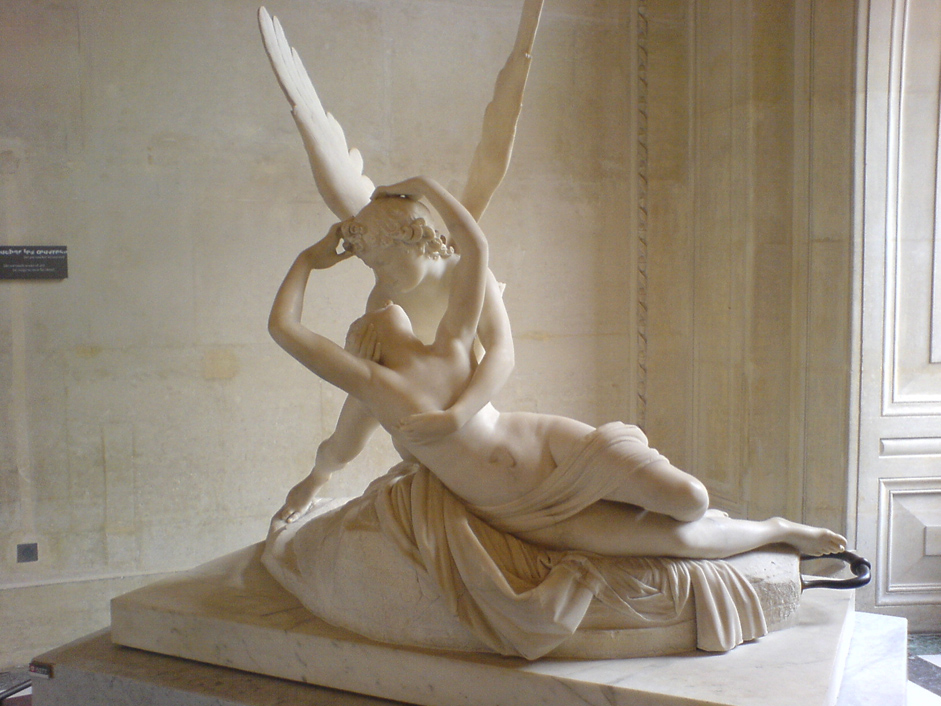Armed with a powerful bow and a collection of threatening arrows, Cupid was the Roman god of love who was constantly affecting the emotions of his many fellow gods. Originally the mythology associated with Cupid was from the Greeks. “The god the Romans knew as Cupid was adapted from the Greek god, Eros.”1 On any occasion, whenever one was struck with one of Cupid’s golden arrows one would fall in love with whomever Cupid wanted. However, if one were struck by an arrow made out of lead, one would be repulsed by whoever Cupid decided.
One of the most acknowledged myths about Cupid, written by Apuleius in his Metamorphoses, involved the mortal princess Psyche. There are many other versions of this story, and in most of these Cupid is portrayed to be a passionate lover. “Cupid and Psyche, is … a tale of the quest for divine knowledge and the failings of the human spirit.”2 When Venus, Cupid’s mother, first met Psyche, who was a beautiful young woman, she realized how jealous she was of Psyche, and ordered Cupid to use his arrows to ruin her love life. Venus demanded that Cupid shoot Psyche with an arrow, so that when he strikes Psyche she must be looking “toward a creature so hideous that mortals will be filled with loathing.”3 While Cupid was getting ready to strike her, he became fascinated by her elegance; he lost hold of his arrow and ended up hitting his leg. From this moment forward he did whatever he could to make sure that she would be his forever. Zephyrus, god of the west winds, came as an accomplice to help Cupid. They took her to a grove of trees, which she saw as a superior palace. After entering this lavish but skimpy palace, a voice invited her to eat in what was said to be her new home.4 She received noticed that her supposed morbid lover would be there to meet her at nightfall. The voice declared “I am your husband. I will visit with you every evening but, unfortunately, I must leave before the first sign of morning. Never, ever ask or try to see me!”5

For a while Psyche was satisfied with this platonic love with Cupid, not knowing who he was, but simply believing he was her destined lover.6 Although she became accustomed to this new lifestyle, she found herself missing her family. Cupid, her after-dark lover, granted her permission to have her sisters join her.7 Unfortunately, rather than being grateful to see their sister, they were overly jealous and planted ideas in Psyche’s head to trick her unknown lover.8 “They suggest that her lover is a serpent who changes into the form of a youth at night, a monster who will at last devour her.”9 They told her to have a knife and lamp with her while she was sleeping so that when he came for his nightly visit she would be able to slay him as he sleeps.
Naively, Psyche prepared herself to see a man who she had fallen hopeless for. Ready to strike him, she brought the lamp close enough to see him.10 When she looked at this beautiful young man, she became defenseless. He awoke to see her paralyzed by what she had seen. “With the warning that love cannot live with suspicion, he leaves the palace.”11 Psyche woke up to find that the palace had been dispersed, and she went to search for her forbidden lover. Cupid decided to take his anger out on her sisters by leading them to “the arms of Death to welcome them.”12 While Psyche searched for some answers, she was turned away by everyone, finding herself confronted by Venus. Instead of Venus killing Psyche, she decided that the best thing to do would be to keep her as a slave.13

In order for Venus not to kill Psyche, she decided to let her live only by having her complete a new task for her everyday. “Psyche’s first task is to sort a huge pile of mixed seeds and grain into separate heaps, with the warning that if there is so much as one seed in the wrong pile she will be punished.”14 Psyche took forever to complete this tedious task; so Cupid decided to intervene, and he demanded a myriad of ants to finish it off for her. For whatever odd reason, she was asked to put together a golden fleece for Venus from all of her sheep. Psyche was frighten to attempt this in the daylight, so she stayed up until all had fallen asleep.15 After having succeeded at that task, Psyche was then challenged to go the river that flowed around the mischievous underworld, to fill up a jug with black water. Cleverly, Cupid came to rescue his mortal princess, and had an eagle fly to get and bring back the water for her. Venus accepted the water but planned that her next task would be to kill Psyche by having her travel to the land of the dead. She was told that she needed to acquire a bit of the dazzling goddess Proserpine in a golden box. Venus made a compromise that if she completed this task, already knowing Psyche would not survive it, she would treat her better in the future. Psyche realized that this task was an impossible one, and despairing, she decided to commit suicide. Before doing this, a voice told her that there was a way for her to complete this unattainable task.16
Believing this voice that had guided her in the past, she attempted to accomplish the task. She followed all the steps she was given.17 Thinking she would be able to obtain whatever remained in the box, she decided to open it. Needless to say, she ended up falling into an unconscious sleep brimming with nightmares.18 Without Cupid coming to her rescue, she could have been trapped in her sleep, tormented, forever.
After having sent Psyche with the box to his mother, Cupid then began to beg with Jupiter for Psyche to be made immortal.19 Jupiter decided to let Psyche join them in this immortal world, once hearing Cupid’s petition. There she drank a cup of ambrosia that Jupiter handed her, and became an immortal goddess.20
It was only then that Cupid and Psyche were able to remain unified for an eternal life together.
- Salem Press Encyclopedia, 2016, s.v. “Cupid (Mythology),” by Janine Ungvarsky. ↵
- Salem Press Encyclopedia of Literature, 2015, s.v. “Cupid and Psyche,” by T. Fleischmann Mfa. ↵
- E. N. Genovese, “Cupid and Psyche,” Masterplots, Fourth Edition, November 2010, 2. ↵
- Salem Press Encyclopedia of Literature, 2015, s.v. “Cupid and Psyche,” by T. Fleischmann Mfa. ↵
- Rosalie F. Baker “What if the Goddess of Love was your mother-in-law?,” Calliope vol. 23 no. 3 (Nov/Dec 2012): 19. ↵
- S. Parker and P. Murgatroyd, “Love Poetry and Apuleius’ ‘Cupid and Psyche,’” The Classical Quarterly 52, no. 1 (2002): 402. ↵
- E. N. Genovese, “Cupid and Psyche,” Masterplots, Fourth Edition, November 2010, 2. ↵
- Rosalie F. Baker “What if the Goddess of Love was your mother-in-law?,” Calliope vol. 23 no. 3 (Nov/Dec 2012): 20. ↵
- E. N. Genovese, “Cupid and Psyche,” Masterplots, Fourth Edition, November 2010, 2. ↵
- Salem Press Encyclopedia of Literature, 2015, s.v. “Cupid and Psyche,” by T. Fleischmann Mfa. ↵
- E. N. Genovese, “Cupid and Psyche,” Masterplots, Fourth Edition, November 2010, 2. ↵
- E. N. Genovese, “Cupid and Psyche,” Masterplots, Fourth Edition, November 2010, 2. ↵
- Rosalie F. Baker “What if the Goddess of Love was your mother-in-law?,” Calliope vol. 23 no. 3 (Nov/Dec 2012): 22. ↵
- E. N. Genovese, “Cupid and Psyche,” Masterplots, Fourth Edition, November 2010, 2. ↵
- Salem Press Encyclopedia of Literature, 2015, s.v. “Cupid and Psyche,” by T. Fleischmann Mfa . ↵
- E. N. Genovese, “Cupid and Psyche,” Masterplots, Fourth Edition, November 2010, 2. ↵
- E. N. Genovese, “Cupid and Psyche,” Masterplots, Fourth Edition, November 2010, 2. ↵
- Salem Press Encyclopedia of Literature, 2015, s.v. “Cupid and Psyche,” by T. Fleischmann Mfa . ↵
- Kirsten Hall, “‘It Is All One’: Hetty Sorrel and the Myth of Cupid and Psyche,” Renascence: Essays on Values in Literature 67, no. 4 (Fall 2015): 289. ↵
- Salem Press Encyclopedia of Literature, 2015 “Cupid and Psyche,” by T. Fleischmann Mfa. ↵



122 comments
Pamela Callahan
I have never read or learned much about ancient mythological characters. I found this story really fascinating and I enjoyed reading it. After having read it I now have a much better understanding of the mythological characters and their stories. The author did a great job explaining the storyline, and I was able to try and envision everything that I was reading.
Raymond Munoz
Normally, I am a Greek mythology reader, but the Roman mythology intrigues from time to time with it the easier to pronounce names. Though besides the easy and familiar names of the Roman Gods, I was also intrigued by the demonstration of “blind love.” The article never refers to Psyche and Cupid’s love as “blind”, but this is an inference I made because Psyche is so willing to be with this “man”, Cupid, who she knows nothing about. My only issue with the format was the fact that some transitions from paragraph to paragraph seemed repetitive, rather than a smooth transition. Other than the minor issue of repetition, I felt the author did an amazing job of telling the story of Cupid and Psyche.
Daniela Duran
This was fascinating! I really enjoyed reading this article, because I had heard about cupid my entire life, but I had never thought of him as a mythological character! It’s funny how I had always associated him with love, but I had never heard his OWN love story. I loved how he always protected Psyche, even though she betrayed him at some point, because it demonstrates his true love for her! Also, I cannot imagine how hard it must have been for her to have a husband, but never being able to see him! This was a truly a very interesting article!
Martina Rodriguez
Funny article title! It really grabs ones attention. I’ve read the myth before, but I had never heard of the effects of the lead arrow, only the arrow that makes one fall in love. The author has a very distinct way of speaking\telling the story that made the article that much more enjoyable. After finishing the article I realized there was a lot of key facts that I’ve forgotten over the years. A lovely read!
Kathyleen Lauriano
First off I love the title, its very eye catching. I never knew much about Cupid other than he made people fall in love. I feel this article really gave me a better understanding of who Cupid was and about his love towards Psyche. The fact that Venus gave her impossible tasks and he was always at her rescue shows how powerful his love was towards her.
Emily Jensen
Greek mythology is always so interesting to read about. All the different gods and goddesses seem to have just as much drama as those we now idolize, like celebrities, in society today. I knew somewhat of the story of Cupid and Psyche, how Venus tried over and over again to destroy Psyche, and how Cupid would always come to her rescue. I really liked how this story went into detail of the absurd tasks Venus would assign and how Cupid would always save the day.
Valeria Perez
I enjoyed how clever the title of this article was!
Before this article the few things I knew about Cupid were all related to Valentine’s Day. It is interesting to read how the origins of Cupid and Psyche’s love story all started because of jealousy. I am constantly intrigued by how the Romans portrayed their gods and their stories with very human emotions. In this case jealousy, passion, doubt, and betrayal. They are divine but flawed.
Gabriela Ochoa
This article was really interesting it countered the typical idea of cupid and the title is great. I think we have all heard of arrow being sot to make people fall in love but arrows of lead that made someone repulsed was new. The story of Psyche and what Venus made her do to prove herself were intense, with each task she completed she came closer to her death. In the end she did die in order to be with cupid which made the story interesting and sad to read.
Anna Guaderrama
I really loved reading this article! I feel like cupid is always overused in the stereotypical way it’s presented but it is interesting to read about it in a different light. Behind the whole annoying and overly mushy arrows, hearts, and wings It’s comforting to know that there’s more to it than just this image we have all come to know. Honestly, though reading about this shocked me especially when I read about how in order for Venus not to kill Psyche, all she had to do, mainly because I was not expecting it.
Kimberly Simmons
When one thinks of Cupid, they imagine a baby in a diaper shooting arrows at people so that they fall in love. This article shows that the myth is much deeper than that. I never knew about the supposed lead arrows that cause repulsion – that’s contradictory to what Cupid symbolizes. The story of Psyche is interesting, sad, and happy all at once.